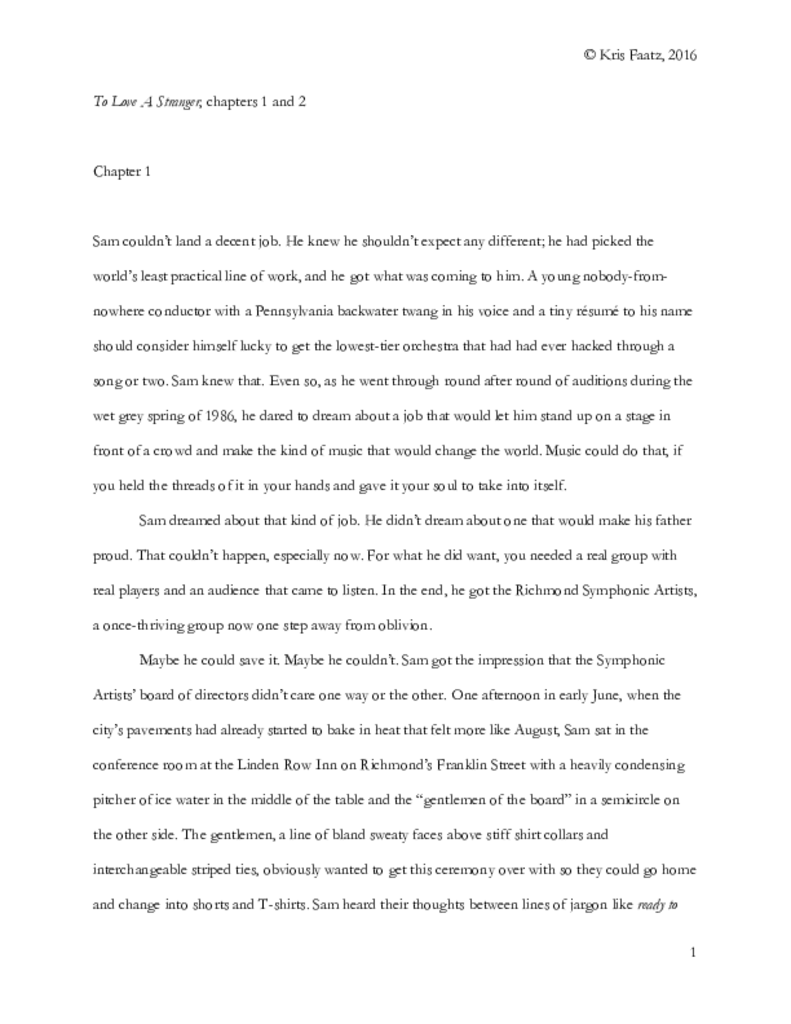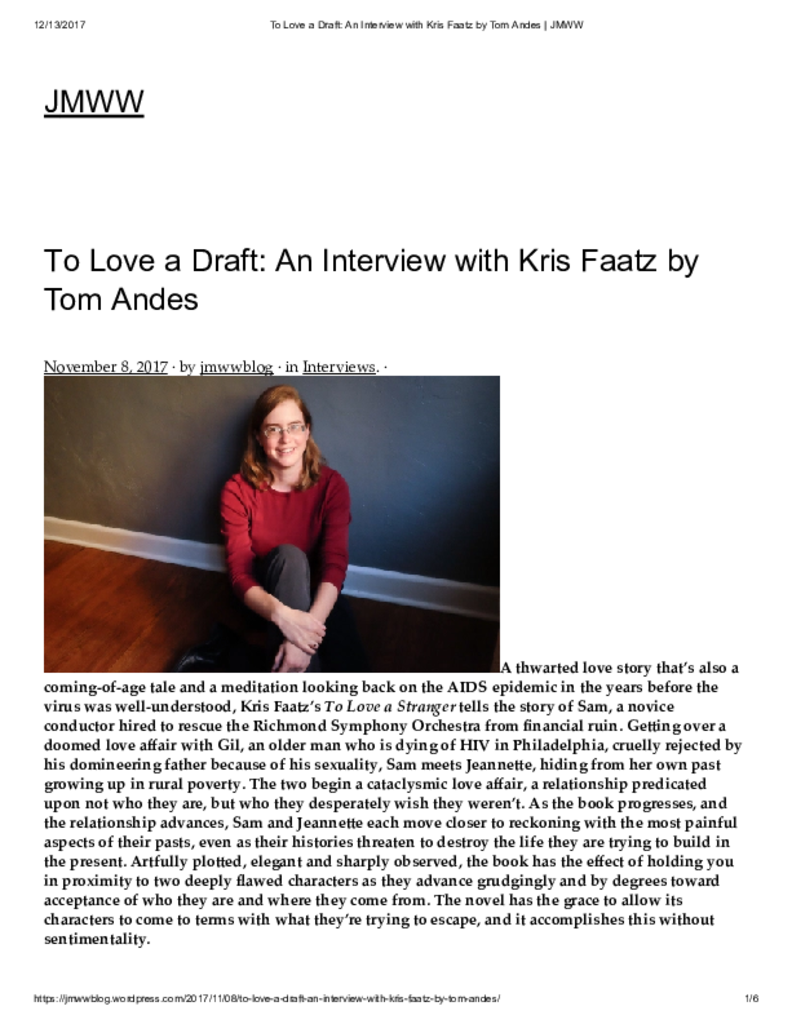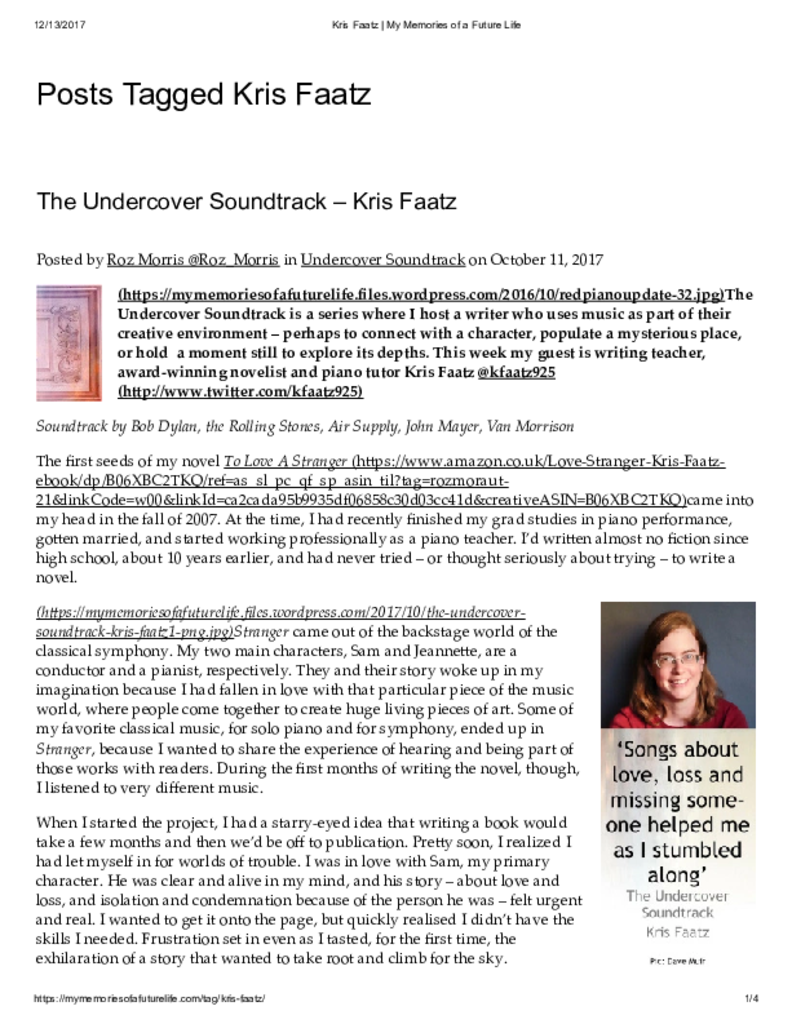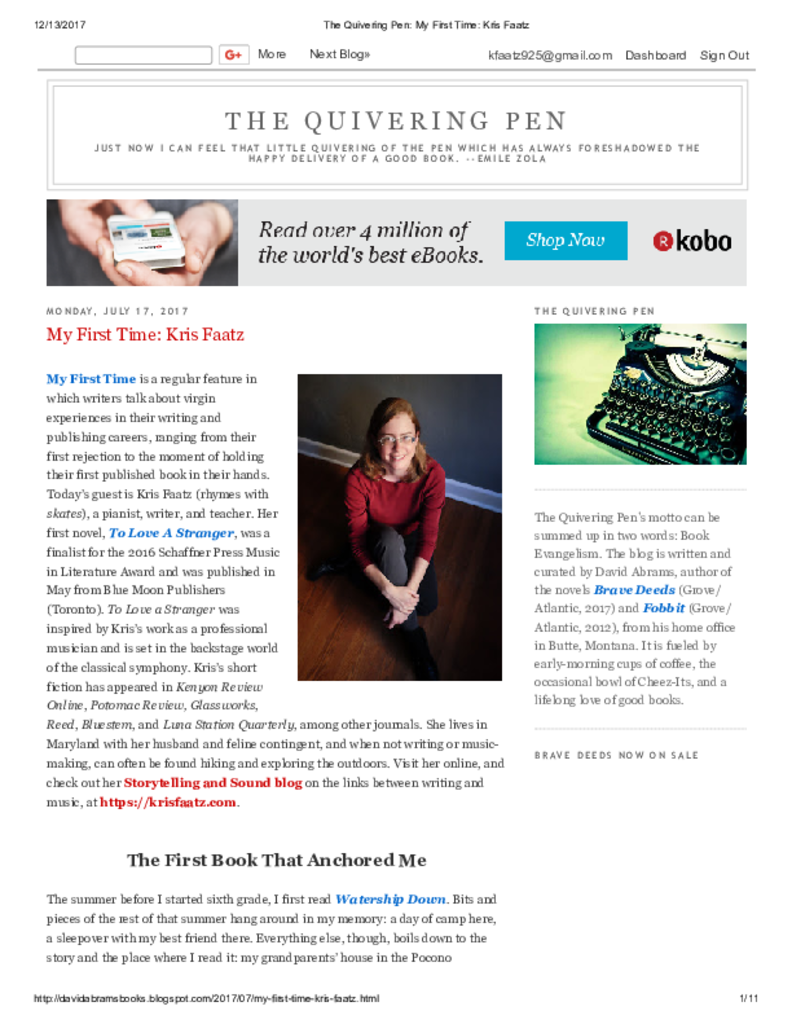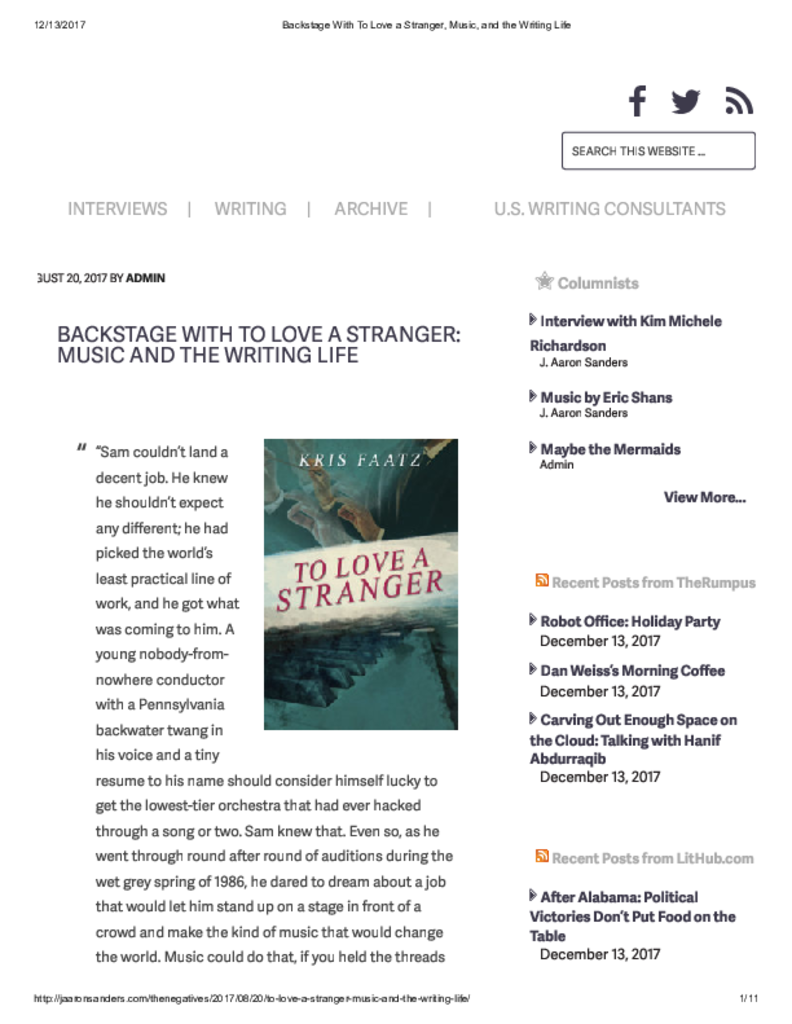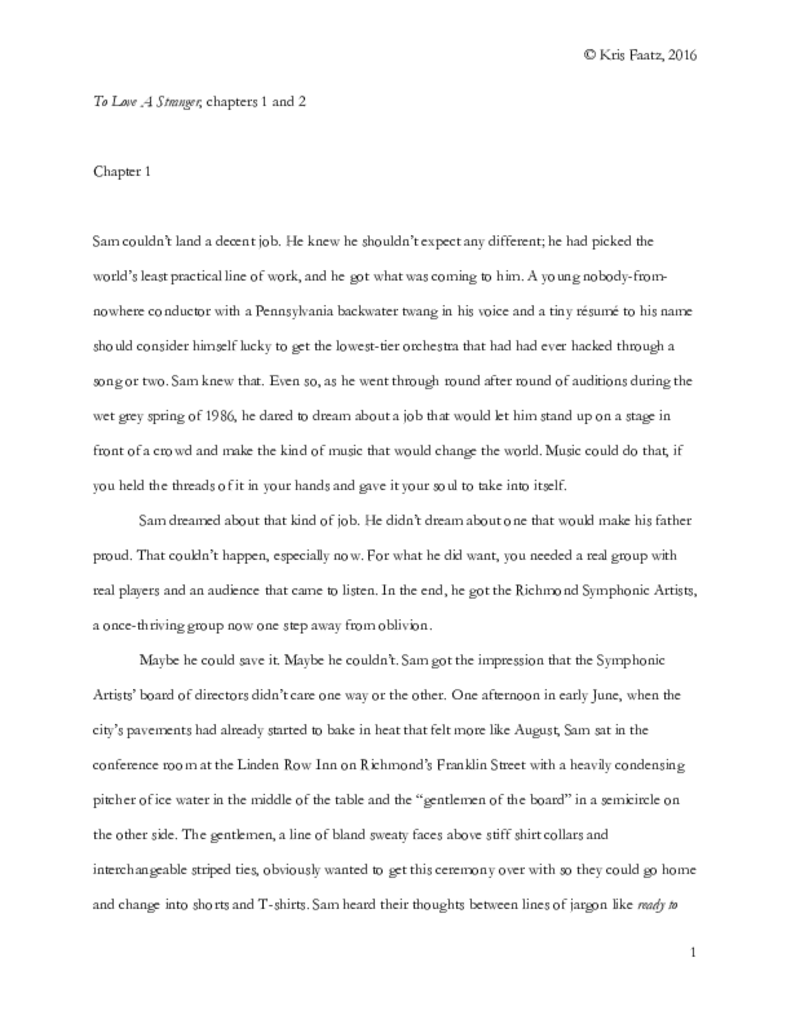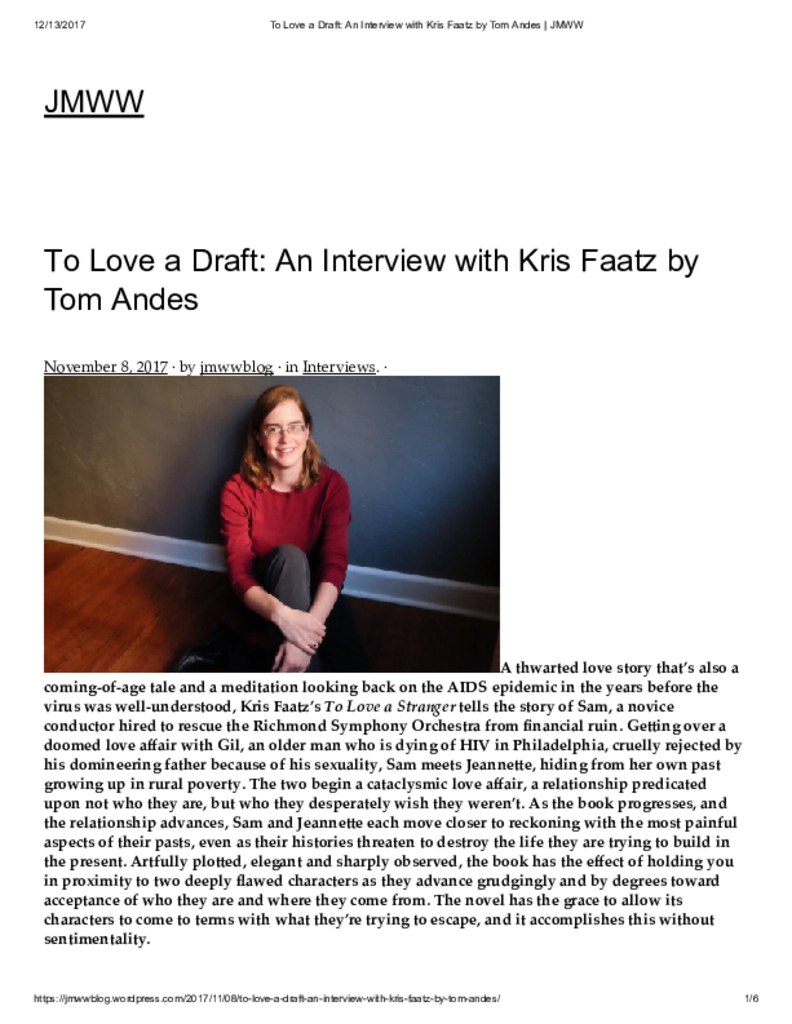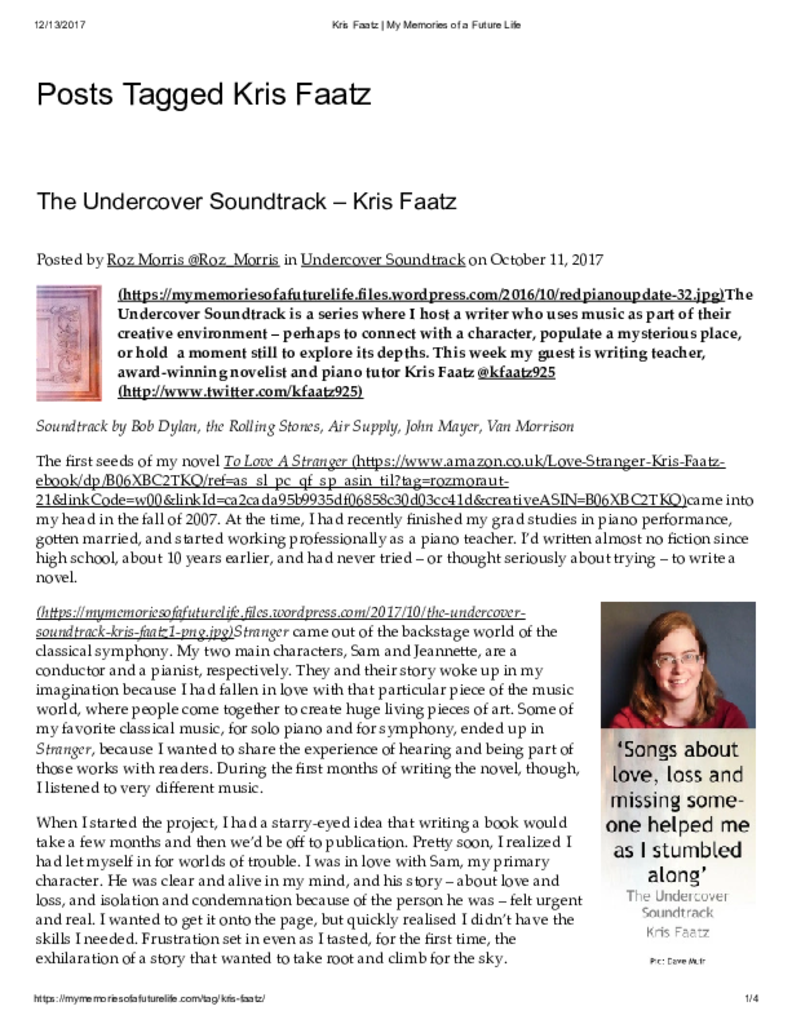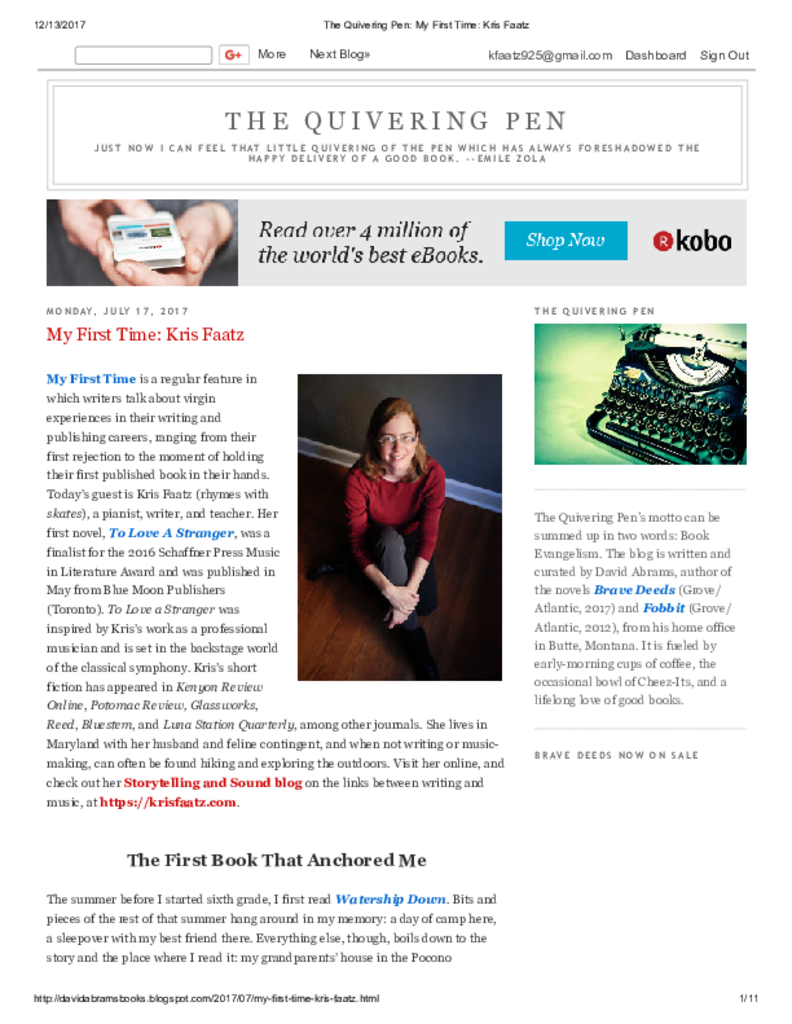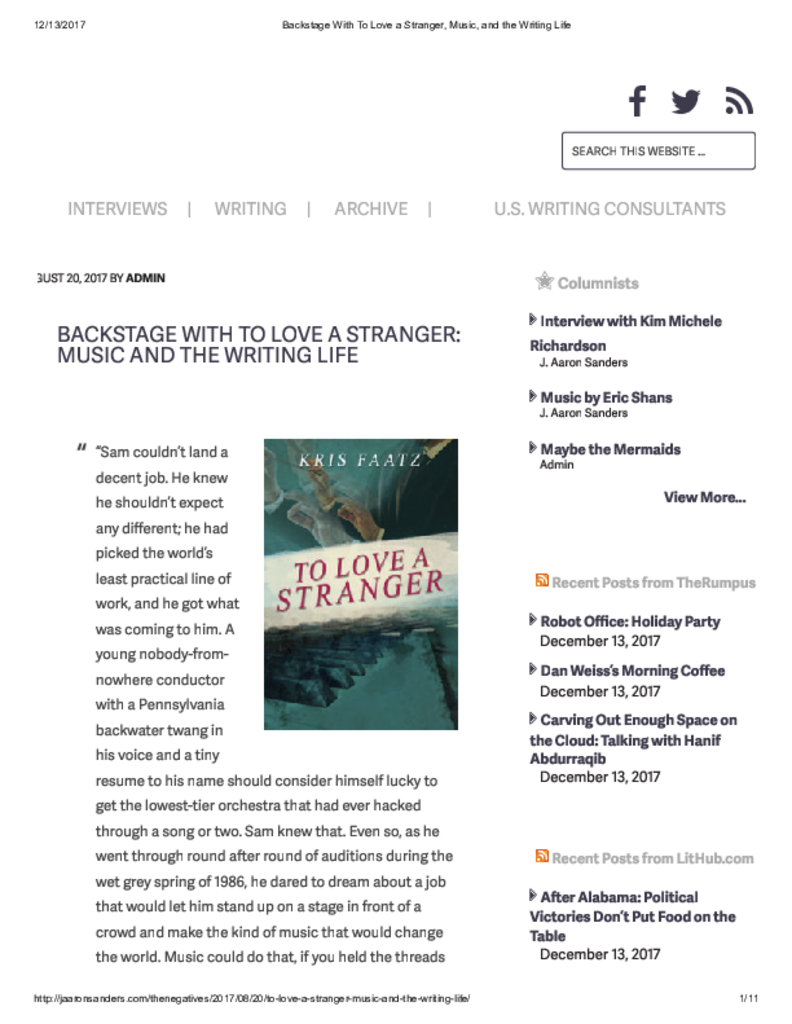About Kris
Baltimore County
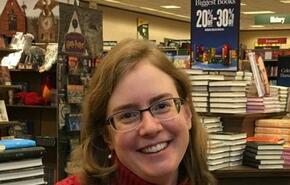
Kris Faatz (rhymes with skates) is a writer, pianist, and teacher. Her short fiction has appeared in journals including Los Angeles Review, NELLE, and Typehouse Magazine, and has received recognition in competitions run by Tiferet Journal, Philadelphia Stories, Uncharted Magazine, Dzanc Books, and others. Most recently she received NELLE's 2022 Three Sisters Award. Her first novel, TO LOVE A STRANGER (Blue Moon Publishers, 2017) was a finalist for the Schaffner Press Music in Literature Award.… more
Jump to a project:
The Sphere of Time
"The Sphere of Time" had its first incarnation five years ago as "Verses," one of my first short stories. The inspiration for it came from the experience of two dear family friends, a husband and wife who were facing the wife's terminal illness. Her husband was some twenty years her senior. I was profoundly moved by their constant and deep commitment to each other and the way in which they both faced the fact that her time was running out.
It can be difficult to write stories based on truth because you worry about exploiting the experiences of others, especially as they go through their most challenging times. I felt that this couple's story needed to be put on the page and shared because of their courage and because of the unique perspective that the husband in particular had on the issue of mortality. He was a professor of physics, and during his career had been particularly fascinated with the study and nature of time. For me, the idea of bringing an abstract/theoretical understanding of the nature of time into conjunction with the hard-and-fast issue of death was intensely compelling.
"The Sphere of Time" went through many versions before settling into this final one. As with all stories, the characters developed personalities and backgrounds of their own, but I felt that the final result got as close as it could to what I'd hoped for it.
"The Sphere of Time" was published in October 2013 by the Kenyon Review, in their online edition. I've also included the audio file of my reading of the piece, which appeared in KROnline with the printed version.
It can be difficult to write stories based on truth because you worry about exploiting the experiences of others, especially as they go through their most challenging times. I felt that this couple's story needed to be put on the page and shared because of their courage and because of the unique perspective that the husband in particular had on the issue of mortality. He was a professor of physics, and during his career had been particularly fascinated with the study and nature of time. For me, the idea of bringing an abstract/theoretical understanding of the nature of time into conjunction with the hard-and-fast issue of death was intensely compelling.
"The Sphere of Time" went through many versions before settling into this final one. As with all stories, the characters developed personalities and backgrounds of their own, but I felt that the final result got as close as it could to what I'd hoped for it.
"The Sphere of Time" was published in October 2013 by the Kenyon Review, in their online edition. I've also included the audio file of my reading of the piece, which appeared in KROnline with the printed version.
Dandelion Wish
"Dandelion Wish" is a short story that grew out of an incident from family history. A nosy neighbor advised a young new mom, whose baby had been born early and had to stay in the hospital, that she shouldn't buy baby clothes until she had the chance to "see if it lives." The (probably) unintentional nastiness of that comment struck me as the perfect seed for a story. The young mom in "Dandelion Wish," her own mother and the nosy neighbor are all fictional representations who took on personalities of their own. It was great fun to watch them develop and go along for the ride.
I've remained fascinated with the characters in this story, whose lives extend well beyond the pages here, and am exploring using the story as a jumping-off point for a novel that takes place in the late 1950s. The young mom unintentionally becomes an member of the vanguard of emancipated women, as she raises her child (who *does* make it home from the hospital) without help from a husband. I was born in the late '70s and grew up in a time when the idea of women's equality, though still not fully realized, was taken much more for granted. I find it fascinating to look back at earlier generations and what they experienced. The mother in this story ended up on an entirely different adventure than the one she had planned for. Her story intrigues and inspires me, and I hope to get it more fully onto the page in a longer form.
"Dandelion Wish" was published in March 2015 by Glassworks Magazine.
I've remained fascinated with the characters in this story, whose lives extend well beyond the pages here, and am exploring using the story as a jumping-off point for a novel that takes place in the late 1950s. The young mom unintentionally becomes an member of the vanguard of emancipated women, as she raises her child (who *does* make it home from the hospital) without help from a husband. I was born in the late '70s and grew up in a time when the idea of women's equality, though still not fully realized, was taken much more for granted. I find it fascinating to look back at earlier generations and what they experienced. The mother in this story ended up on an entirely different adventure than the one she had planned for. Her story intrigues and inspires me, and I hope to get it more fully onto the page in a longer form.
"Dandelion Wish" was published in March 2015 by Glassworks Magazine.
Great Blue Heron
"Great Blue Heron" is a short story that developed out of a piece I wrote in high school.
I don't often write from the perspective of children, but in this case I decided to use a young narrator (age 13) who can't fully understand what's really going on with the main character, "the woman with birds in her head." His innocence, to me, provided the best view of her torment, and added extra tension to the story as he tried to cope with a situation totally beyond his usual experience. His innocence also gave him a misplaced sense of responsibility that provided powerful energy for the narrative.
I've found in writing stories that often the first seed of inspiration has to gestate for a while before I can put it on the page, and that very often it needs to combine with a couple of other elements, for instance a particular setting, a new character, or an object I hadn't thought of, before it turns into a story. In this case, the missing piece emerged when my husband and I spent time in the Adirondacks two summers ago. That setting of woods, faded small towns, blue sky and tannin-filled streams became the perfect element to join with my original idea, and the story grew from there.
"Great Blue Heron" was published in June 2015 by Bluestem Magazine.
I don't often write from the perspective of children, but in this case I decided to use a young narrator (age 13) who can't fully understand what's really going on with the main character, "the woman with birds in her head." His innocence, to me, provided the best view of her torment, and added extra tension to the story as he tried to cope with a situation totally beyond his usual experience. His innocence also gave him a misplaced sense of responsibility that provided powerful energy for the narrative.
I've found in writing stories that often the first seed of inspiration has to gestate for a while before I can put it on the page, and that very often it needs to combine with a couple of other elements, for instance a particular setting, a new character, or an object I hadn't thought of, before it turns into a story. In this case, the missing piece emerged when my husband and I spent time in the Adirondacks two summers ago. That setting of woods, faded small towns, blue sky and tannin-filled streams became the perfect element to join with my original idea, and the story grew from there.
"Great Blue Heron" was published in June 2015 by Bluestem Magazine.
Ivory-Bill Sighting
The short story "Ivory-Bill Sighting" was inspired by the experience of an amazing and brave artist friend who has spent much of her life pushing back against physical infirmity, creating beautiful art and bringing important messages about the environment and sustainability to the world.
As often happens with stories, I found that this piece didn't go where I initially thought it would. My protagonist was originally supposed to see a hummingbird, but the mythical ivory-billed woodpecker appeared in the first paragraph and wouldn't be dislodged. Sometimes you have to run with the details. In this case, I was glad I did: the story ended up being about lost creatures, lost souls, and the hope that emerges in spite of dark circumstances. I don't know if any other bird would have been as appropriate as one that came out of legend.
"Ivory-Bill Sighting" was published in November 2015 by Helen: A Literary Magazine.
As often happens with stories, I found that this piece didn't go where I initially thought it would. My protagonist was originally supposed to see a hummingbird, but the mythical ivory-billed woodpecker appeared in the first paragraph and wouldn't be dislodged. Sometimes you have to run with the details. In this case, I was glad I did: the story ended up being about lost creatures, lost souls, and the hope that emerges in spite of dark circumstances. I don't know if any other bird would have been as appropriate as one that came out of legend.
"Ivory-Bill Sighting" was published in November 2015 by Helen: A Literary Magazine.
Unraveled Souls
"Unraveled Souls" is a short story that came out of a small incident: my husband deciding to put his old electric keyboard out with the trash one night. Both he and I are musicians, and it felt strange to us to leave the keyboard out in the rain for the trash truck to pick up in the morning. I remember him saying goodbye to it as we went back into the house.
For several months, I played with the idea of writing a story from the trash collector's viewpoint: how that person might have found the keyboard and maybe wondered about its owners, or had some significant experience because of that one strange item of garbage. In the end, though, the story that ended up on paper was quite different. My protagonist's wife turned out to be a knitter, and the project she was knitting on page one turned out to be a baby blanket. I hadn't planned on either of those details, but they came into the story, and the plotline then wove itself around them.
"Unraveled Souls" was shortlisted for Reed Magazine's 2014 John Steinbeck Award for short fiction, and was published by Reed Magazine in May 2015.
For several months, I played with the idea of writing a story from the trash collector's viewpoint: how that person might have found the keyboard and maybe wondered about its owners, or had some significant experience because of that one strange item of garbage. In the end, though, the story that ended up on paper was quite different. My protagonist's wife turned out to be a knitter, and the project she was knitting on page one turned out to be a baby blanket. I hadn't planned on either of those details, but they came into the story, and the plotline then wove itself around them.
"Unraveled Souls" was shortlisted for Reed Magazine's 2014 John Steinbeck Award for short fiction, and was published by Reed Magazine in May 2015.
A Funnel of Time
The short story "A Funnel of Time," my first serious foray into magical realism, was inspired by a biography of Zelda Fitzgerald (Zelda Fitzgerald: Her Voice in Paradise, by Sally Cline). I've been fascinated with the Fitzgeralds, especially Zelda, since reading The Great Gatsby in high school. When I read the Cline biography this past spring, I decided to experiment with a story in tribute to Zelda's experience.
I found it both challenging and moving to read about a woman who didn't conform to the 1930s standard of femininity, who struggled every day to hold onto her sense of identity as a person and an artist, and who was subjected to rough and poorly-understood psychiatric treatment in an effort to force her to fit into the mold of ideal wife and mother.
I didn't want to write a story only about Zelda, though, since there have been many such, so I experimented with linking her narrative to the narrative of a present-day fictional protagonist. My protagonist Mari has been placed in one of the same mental hospitals where Zelda was treated (Sheppard Pratt). The goal for Mari's treatment is to make her let go of her memories of abuse by her father. In the story, Mari and Zelda are able to communicate with each other through the hypothetical "funnel of time," supporting each other as they hold onto their individual truths.
"A Funnel of Time" was published in December 2015 by Luna Station Quarterly, a journal of speculative fiction by women.
I found it both challenging and moving to read about a woman who didn't conform to the 1930s standard of femininity, who struggled every day to hold onto her sense of identity as a person and an artist, and who was subjected to rough and poorly-understood psychiatric treatment in an effort to force her to fit into the mold of ideal wife and mother.
I didn't want to write a story only about Zelda, though, since there have been many such, so I experimented with linking her narrative to the narrative of a present-day fictional protagonist. My protagonist Mari has been placed in one of the same mental hospitals where Zelda was treated (Sheppard Pratt). The goal for Mari's treatment is to make her let go of her memories of abuse by her father. In the story, Mari and Zelda are able to communicate with each other through the hypothetical "funnel of time," supporting each other as they hold onto their individual truths.
"A Funnel of Time" was published in December 2015 by Luna Station Quarterly, a journal of speculative fiction by women.
TO LOVE A STRANGER
My first novel, To Love A Stranger, was written, edited, and re-written over a period of ten years. During this time, my career shifted from focusing on music to writing and teaching fiction professionally. The novel draws on my own experiences of the backstage world of classical music; I wanted both to translate the "heard" experience of music to the page, and to engage with issues of social and societal justice relevant to that community and the wider world.
Praise for To Love A Stranger:
"How well do we know the people we love? This question is at the heart of Kris Faatz's beautifully written first novel. With Sam and Jeannette, Faatz has created two sympathetic, deeply flawed characters, driven by loneliness and a desire to belong. Set in the 1980s, at the height of the AIDS epidemic, their story unfolds with tragic inevitability. Compassionate and emotionally engaging, To Love A Stranger is a page-turner, a story that will resonate with the reader for a long time to come." - Geeta Kothari, author of I Brake For Moose and Other Stories
"Readers are safe in this author's thoughtful hands, amidst these gorgeous words, in this world rich with the heady sounds of darkness, honesty, forgiveness. To Love A Stranger is written with the harmony of humanity in mind. To Love A Stranger is a song." - Leesa Cross-Smith, author of Whiskey and Ribbons
"Artfully plotted, elegant and sharply observed, the book has the effect of holding you in proximity to two deeply flawed characters as they advance grudgingly and by degrees toward acceptance of who they are and where they come from. The novel has the grace to allow its characters to come to terms with what they're trying to escape, and it accomplishes this without sentimentality." - Tom Andes, interviewer, JMWW Magazine
Praise for To Love A Stranger:
"How well do we know the people we love? This question is at the heart of Kris Faatz's beautifully written first novel. With Sam and Jeannette, Faatz has created two sympathetic, deeply flawed characters, driven by loneliness and a desire to belong. Set in the 1980s, at the height of the AIDS epidemic, their story unfolds with tragic inevitability. Compassionate and emotionally engaging, To Love A Stranger is a page-turner, a story that will resonate with the reader for a long time to come." - Geeta Kothari, author of I Brake For Moose and Other Stories
"Readers are safe in this author's thoughtful hands, amidst these gorgeous words, in this world rich with the heady sounds of darkness, honesty, forgiveness. To Love A Stranger is written with the harmony of humanity in mind. To Love A Stranger is a song." - Leesa Cross-Smith, author of Whiskey and Ribbons
"Artfully plotted, elegant and sharply observed, the book has the effect of holding you in proximity to two deeply flawed characters as they advance grudgingly and by degrees toward acceptance of who they are and where they come from. The novel has the grace to allow its characters to come to terms with what they're trying to escape, and it accomplishes this without sentimentality." - Tom Andes, interviewer, JMWW Magazine
-
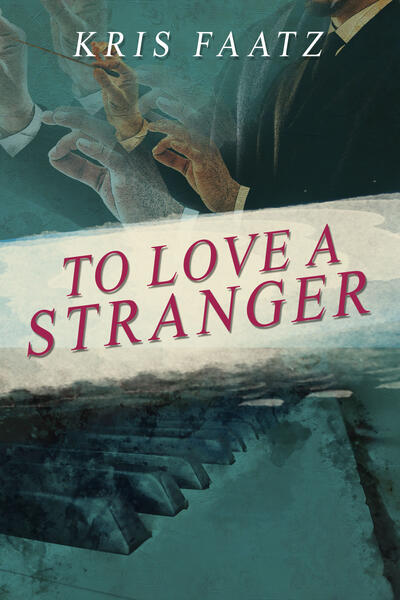 To Love A Stranger, front coverThe front cover of my music-inspired debut novel, released May 2017 by Blue Moon Publishers (Toronto).
To Love A Stranger, front coverThe front cover of my music-inspired debut novel, released May 2017 by Blue Moon Publishers (Toronto). -
Launch party excerpt: TLAS reading and Brahms intermezziFrom the video taken at TO LOVE A STRANGER's launch party, which included Kris's solo piano recital of music featured in the book. This excerpt includes a reading from STRANGER, two intermezzi (Op. 116 no. 6 and Op. 117 no. 1) by Johannes Brahms, and Kris's comments on the historical background of the music.
-
To Love a Draft_ An Interview with Kris Faatz by Tom Andes _ JMWW.pdfMy interview at JMWW Journal with writer Tom Andes: "I thought about the shattering loneliness [AIDS] patients must have experienced, and the stigma surrounding them, and wanted to bring the human experience of their love and loss to the page."
-
The Quivering Pen_ My First Time_ Kris Faatz.pdfMy "My First Time" column at The Quivering Pen: " If you’ve read [Watership Down], you might remember Dandelion, the warren’s own storyteller, the keeper of his people’s history and, often, the source of their courage. I saw what he did inside the story, and I saw what the writer did outside it. Without meaning to, I found myself imitating the way Richard Adams wrote: the gentle voice, the depth of detail, the meditative, immersive tone. I didn’t know anything about him other than the book he had written, but for me, he was a hero."
-
Backstage With To Love a Stranger, Music, and the Writing Life.pdfTO LOVE A STRANGER's feature article at The Negatives: "Early on in my musical training, I began thinking of music and instruments as living things....When I practiced, making music felt like talking to the instrument, as if it and I were having a conversation that communicated more than words ever could. Anything I thought or felt, even the most difficult things – especially the most difficult things – had an outlet in what I played. The piano always understood."













